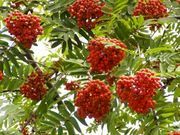|

Mountain Ash |
A somewhat common, and handsomely conspicuous tree in many parts of England, especially about high lands, is the Rowan, or Mountain Ash. In May and June it attracts attention by its bright green feathery foliage set off by cream-colored bloom, whilst in September it bears a brilliant fruitage of berries, richly orange in color at first, but presently of a clear ripe vermilion. Popularly this abundant fruit is supposed to be poisonous, but such is far from being the case. A
most excellent and wholesome jelly may be prepared there from, which is slightly tonic by its salutary bitterness, and is an admirable |
antiseptic accompaniment to certain roast meats, such as venison and mutton. To make this jelly, boil the berries in water (cold at first) in an enameled preserving pan; when the fruit has become sufficiently soft, run the contents of the pan through a flannel bag without pressure; tie the bag between two chairs, with a basin below, and let the juice strain leisurely through so as to come out clear. Then to each pint of the juice add a pound of sugar, and boil this from ten
to twenty minutes; pour off into warm dry jars, and cover them securely when cool. After the juice has dripped off the fruit a pleasant refreshing drink may be made for children by pouring a kettleful of boiling water through the flannel bag. Some persons mix with the fruit an equal quantity of green apples when making the jelly. Birds, especially field fares, eat the berries with avidity; and a botanical designation of the tree is aucuparia, as signifying fruit used
by the auceps, or bird catcher, with which to bait his snares.
"There is," says an old writer, "in every berry the exhilaration of wine, and the satisfying of old mead; and whosoever shall eat three berries of them, if he has completed a hundred years, he will return to the age of thirty years."
At the same time it must be noted that the leaves of the Mountain Ash are of a poisonous quality, and contain prussic acid like those of the laurel. But, as already shown, the berries, when ripe, may be eaten freely without fear. Chemically they contain tartaric acid when unripe, and both malic and citric acids when ripe. They also furnish sorbin, and parasorbic acid. The unripe fruit and the bark are extremely astringent, being useful in decoction, or infusion, to
check diarrhea; and externally in poultices or lotions, to constringe such relaxed parts as the throat, and lower bowel.
The title Rowan tree has affixed itself to the Mountain Ash, as derived from the Norse, Runa (a charm), because it is supposed to have the power of averting the evil eye.
"Rowan tree and red thread Hold the witches a' in dread."
"Ruma" was really a magician, or whisperer, from ru, to murmur, and in olden times runes, or mystical secrets, were carved exclusively on the Mountain Ash tree in Scandinavia and the British Isles.
Crosses made of the twigs, and tied with red thread were sewn by Highlandmen into their clothes. Dame Sludge fastened a piece of the wood into Flibbertigibbet's collar as a protection against Wayland Smith's sorceries. (Kenilworth). Other folk-names of the tree are Quicken tree, Quick Beam, Wiggen, and Witcher.
The Mountain Ash is botanically a connecting link between the dog rose of our hedges and the apple tree of our orchards. Its flowers exactly resemble apple blossoms, and its thickly-clustered red berries are only small crabs dwarfed by the love of the tree for mountain heights and bleak windy situations. In the harsh cold regions of the north it is only a stunted shrub with leaves split up into many small leaflets, so as to suffer less by any breadth of resistance to the
sharp driving blasts of icy winds.
Confusion has been often made between this tree and the Service tree (Sorbus, or Pyrus domestica), which is quite distinct, being more correctly called Servise tree, from Cerevisia, fermented beer. Formerly this Servise, or Checker-tree, was employed for making an intoxicating drink. Virgil says:
"Et pocula lae Fermento atque acidis imitantur vitea _sorbis_."
"With acid juices from the Service Ash, And humming ale, they make their Lemon Squash."
The fruit of the Service tree (or Witten Pear-tree) resembles a small pear, and is considered in France very useful for dysentery because of its tannin; but this "Pyrus domestica" is a rare tree in England. Sometimes mistaken for it is the wild Service tree (the Pyrus torminalis), much more common in our south country hedges. Its fruit is threaded on long strings, and carried in procession at village feasts in Northamptonshire, but is worthless. Evelyn says, "Ale and beer
brewed from the berries, when ripe, of the true Service tree is an incomparable drink."
Herb Simples
The Primitive Simplers presented here show the way of life in other generations, it is not suggested or recommended trying them yourself. |
|
Garden
Herbs
Home
History of Herbs
Herb Gardening
Herbs for Beginners
Drying & Preserving Herbs
Indoor Herb Gardening
Herb Garden
Hints & Tips
Herbal
Cooking
Herb Chart
Using Herbs
Culinary Herbs
Herb
Oil and Vinegar
Herb Teas
Herb Candy
Herb Jelly
Herb Simples
Preface
Introduction
Alphabetical Listing

Trade
Recipes Online
Share your Recipes with others!!
|


